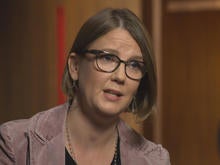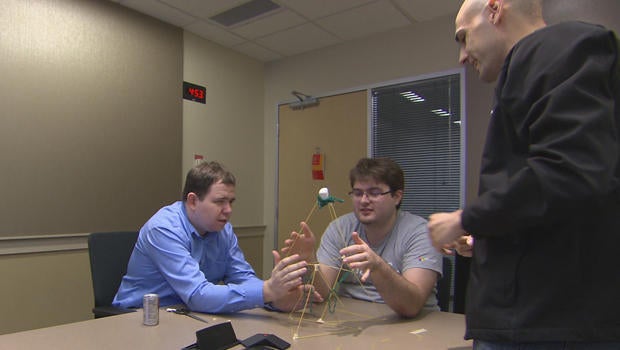AGXStarseed
Well-Known Member
(Not written by me. Due to the article's length, please click the link at the bottom of the page to read the article in full)
We like to think that good work is always rewarded. But what if some people who could do good work can't their foot in the door in the first place? That's where recent hiring initiatives that look beyond unfair stereotypes come in, as Lee Cowan reports in our Cover Story:
Twenty-seven-year-old Christopher Pauley thought he had it all figured out when it came to looking for a job.
He had a detailed spreadsheet of each and every position he applied for -- at least 600.
But despite his degree in computer science from California Polytechnic State University, he went two years with barely a nibble.
Did he get discouraged? "Oh my gosh, my morale really started to drop towards the end," he said. "In fact, there were days where I would either hardly fill out any applications at all, or just simply not apply on anything."
He knew he had the smarts for most jobs; he was a former Spelling Bee Champ, after all. But Pauley struggles with social and communications skills because he's also autistic.
While precise numbers are hard to come by, by some estimates at least 80% of adults with autism are unemployed, even though their IQs are often well above average.
Sometimes their job skills can present themselves in unique ways. For Christopher, it's video games. His ability to recognize patterns and his acute attention to detail -- both hallmarks of autism -- make his playing the video game Rock Band look pretty easy.

Christopher Pauley. CBS NEWS
And they are the same skills he was hoping would impress prospective employers in the computer programming world. But he always had to get past that interview, which was a challenge at best.
Cowan asked, "Was there, in any of those interviews, a time where you just wanted to tell somebody, 'Look, I know my social skills maybe aren't quite what you expect, but I know I can do this job, and I know I can do a really good job if you give me a chance'?"
"Yes."
"But you never said that to anybody?"
"Most of the time, no," he replied.
"Because why?"
"I just wasn't comfortable. It makes me come across as desperate."
At Microsoft, however, there was no need to hide his autism; they were looking for it.
"It's a talent pool that really hasn't been tapped," said Jenny Lay-Flurrie, the chief accessibility officer at tech giant Microsoft outside Seattle.

Jenny Lay-Flurrie, chief accessibility officer at Microsoft. CBS NEWS
"There really is, and was, a lot of data on the table that said to us that we were missing out. We were missing out on an opportunity to bring talent in with autism."
Cowan said, "So in a way, it sounds like this was almost a business imperative."
"Heck, yeah!" she laughed. "People with disabilities are a strength and a force of nature in this company, myself included."
Lay-Flurrie, who is profoundly deaf, communicates by reading lips and working with an interpreter. She helped create a hiring program for Microsoft back in 2015 designed to better identify candidates with autistic talents.
Instead of the traditional job interview focusing so heavily on social skills, the company has replaced it with a vetting process that lasts for weeks, and team building exercises like one called the Marshmallow Challenge.
 Christopher Pauley (left) takes part in a Marshmallow Challenge exercise. CBS NEWS
Christopher Pauley (left) takes part in a Marshmallow Challenge exercise. CBS NEWS
"Being able to watch a candidate in that environment as opposed to sitting across the table interviewing them makes all the difference in the world," said Cowan.
"Every difference," said Lay-Flurrie. "Every day, in any company, in any role, you're going to be asked to work with someone else to figure out a problem or a challenge, or a project."
"And yet in that scenario, they're not as self-conscious that they're being observed for a job -- they're just doing a task."
"It's marshmallows!"
After Christopher Pauley went through a similar, unconventional interview process back in 2016, Microsoft quickly hired him as a software engineer.
His manager Brent Truell says he was immediately impressed by Christopher's "out of the box" thinking.
"When we are faced with really complicated problems, the solutions to those aren't always simple," said Truell. "And Christopher always kind of brings new insights. And having that creative mind, he always brings something new to the team, which is really exciting."
"Which is exactly why you hired him, right?
"Right."
It's an idea that's catching on.
Last April, 50 big-name companies -- including JP Morgan, Ford and Ernst & Young -- came together for a summit on how to bring more autistic adults into the workforce.
It was hosted at the Silicon Valley campus of German software maker SAP, which was one of the first large companies to reach out to the autistic community.
It started its Autism at Work Program almost five years ago, and since then it's hired 128 people on the spectrum, with the goal of hiring more than 600.
"I have been in this industry for close to 30 years, and I can tell you it's probably the single most rewarding program that I have been involved with," said Jose Velasco, who heads the program.
The biggest surprise for him, he says, has been the variety of candidates applying. "Very quickly we started getting resumes from people that had degrees in history, and literature in graphic design, attorneys … the whole gamut of jobs," Velasco said.
"So really, you went into this thinking that people with autism would be good at certain jobs, and what you ended up discovering is they're good at all jobs?" asked Cowan.
"They are good at just about every role."
And they're expected to perform in those roles, just like anyone else.
Mike Seborowski, for example, was hired three years ago and works in cybersecurity in SAP's office outside of Philadelphia. When Cowan was visiting, Jose was helping Mike get ready for a long stint at the company world headquarters in Germany.
Full Article: The growing acceptance of autism in the workplace
We like to think that good work is always rewarded. But what if some people who could do good work can't their foot in the door in the first place? That's where recent hiring initiatives that look beyond unfair stereotypes come in, as Lee Cowan reports in our Cover Story:
Twenty-seven-year-old Christopher Pauley thought he had it all figured out when it came to looking for a job.
He had a detailed spreadsheet of each and every position he applied for -- at least 600.
But despite his degree in computer science from California Polytechnic State University, he went two years with barely a nibble.
Did he get discouraged? "Oh my gosh, my morale really started to drop towards the end," he said. "In fact, there were days where I would either hardly fill out any applications at all, or just simply not apply on anything."
He knew he had the smarts for most jobs; he was a former Spelling Bee Champ, after all. But Pauley struggles with social and communications skills because he's also autistic.
While precise numbers are hard to come by, by some estimates at least 80% of adults with autism are unemployed, even though their IQs are often well above average.
Sometimes their job skills can present themselves in unique ways. For Christopher, it's video games. His ability to recognize patterns and his acute attention to detail -- both hallmarks of autism -- make his playing the video game Rock Band look pretty easy.

Christopher Pauley. CBS NEWS
And they are the same skills he was hoping would impress prospective employers in the computer programming world. But he always had to get past that interview, which was a challenge at best.
Cowan asked, "Was there, in any of those interviews, a time where you just wanted to tell somebody, 'Look, I know my social skills maybe aren't quite what you expect, but I know I can do this job, and I know I can do a really good job if you give me a chance'?"
"Yes."
"But you never said that to anybody?"
"Most of the time, no," he replied.
"Because why?"
"I just wasn't comfortable. It makes me come across as desperate."
At Microsoft, however, there was no need to hide his autism; they were looking for it.
"It's a talent pool that really hasn't been tapped," said Jenny Lay-Flurrie, the chief accessibility officer at tech giant Microsoft outside Seattle.

Jenny Lay-Flurrie, chief accessibility officer at Microsoft. CBS NEWS
"There really is, and was, a lot of data on the table that said to us that we were missing out. We were missing out on an opportunity to bring talent in with autism."
Cowan said, "So in a way, it sounds like this was almost a business imperative."
"Heck, yeah!" she laughed. "People with disabilities are a strength and a force of nature in this company, myself included."
Lay-Flurrie, who is profoundly deaf, communicates by reading lips and working with an interpreter. She helped create a hiring program for Microsoft back in 2015 designed to better identify candidates with autistic talents.
Instead of the traditional job interview focusing so heavily on social skills, the company has replaced it with a vetting process that lasts for weeks, and team building exercises like one called the Marshmallow Challenge.

"Being able to watch a candidate in that environment as opposed to sitting across the table interviewing them makes all the difference in the world," said Cowan.
"Every difference," said Lay-Flurrie. "Every day, in any company, in any role, you're going to be asked to work with someone else to figure out a problem or a challenge, or a project."
"And yet in that scenario, they're not as self-conscious that they're being observed for a job -- they're just doing a task."
"It's marshmallows!"
After Christopher Pauley went through a similar, unconventional interview process back in 2016, Microsoft quickly hired him as a software engineer.
His manager Brent Truell says he was immediately impressed by Christopher's "out of the box" thinking.
"When we are faced with really complicated problems, the solutions to those aren't always simple," said Truell. "And Christopher always kind of brings new insights. And having that creative mind, he always brings something new to the team, which is really exciting."
"Which is exactly why you hired him, right?
"Right."
It's an idea that's catching on.
Last April, 50 big-name companies -- including JP Morgan, Ford and Ernst & Young -- came together for a summit on how to bring more autistic adults into the workforce.
It was hosted at the Silicon Valley campus of German software maker SAP, which was one of the first large companies to reach out to the autistic community.
It started its Autism at Work Program almost five years ago, and since then it's hired 128 people on the spectrum, with the goal of hiring more than 600.
"I have been in this industry for close to 30 years, and I can tell you it's probably the single most rewarding program that I have been involved with," said Jose Velasco, who heads the program.
The biggest surprise for him, he says, has been the variety of candidates applying. "Very quickly we started getting resumes from people that had degrees in history, and literature in graphic design, attorneys … the whole gamut of jobs," Velasco said.
"So really, you went into this thinking that people with autism would be good at certain jobs, and what you ended up discovering is they're good at all jobs?" asked Cowan.
"They are good at just about every role."
And they're expected to perform in those roles, just like anyone else.
Mike Seborowski, for example, was hired three years ago and works in cybersecurity in SAP's office outside of Philadelphia. When Cowan was visiting, Jose was helping Mike get ready for a long stint at the company world headquarters in Germany.
Full Article: The growing acceptance of autism in the workplace
